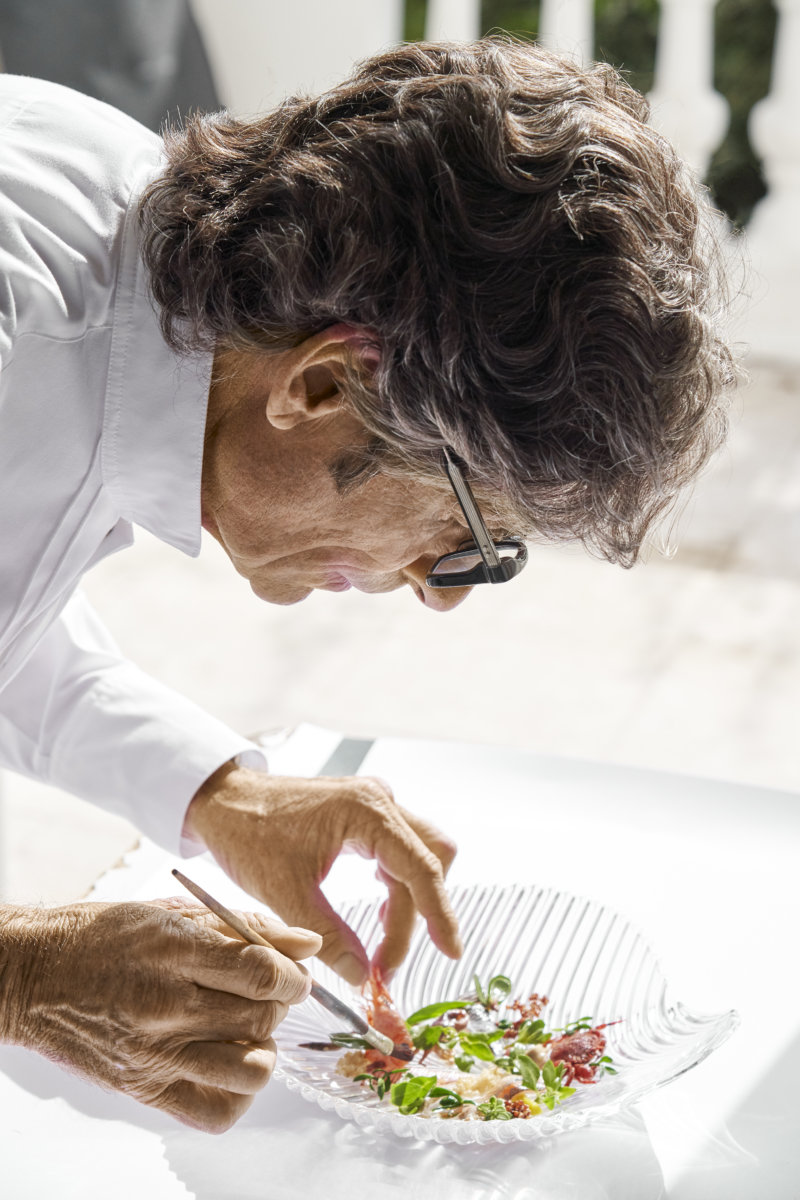Championing women’s roles in the culinary world, Maria Canabal occupies many functions. She is a Journalist, author and founder of Parabere Forum, the first and most important annual event for women in hospitality.
Portrait of a Mediterranean Chef: Gérald Passedat
Curious, fresh, aligned, not one single adjective can begin to describe the renowned French chef Gérald Passedat. Yet, there is one identity he undeniably embodies, that of Marseille. Born and raised and a third-generation chef of the French Mediterranean city, a place Passedat describes as diverse and creative, words that reflect both his cooking and his character.
His restaurant Le Petit Nice – Passedat is a three-michelin-starred seafood temple in the heart of this city of mixity and change, it is home to a quest to bring forgotten fish to center stage, Loup, small rockfish and many others which he receives daily from his 15-strong squad of local fishermen by boat, car or motorbike.

Returning Home
After working in palaces across the globe, from the Bristol to the Hôtel de Crillon, from the United States to Switzerland, Passedat returned home to France and Marseille in the mid nighties to reinvent a family tradition of over 100 years. Yet it wasn’t until the years from 2000 that he tells me, “I understood my path, that I needed to come back to the essential, the sea, salt, diving.”
Passedat’s cooking is light, modern, yet full of flavour, what he modestly dubs Fishermen’s cuisine and sourced from what he calls his kitchen garden: the Mediterranean sea.
The Elements
“I work exclusively with local fishermen, and seasonal local fish. The fish that no one used to eat, the forgotten fish. I don’t order, I work with what the sea offers me. Seasonal fish like the beaux yeux, chapon, mostelle, rouget, canthe. All the small rock fish that are unfamiliar to most people: the verdow, the roucaou, the girelles. It depends on the season, winter is the best season for certain fish.”
The vegetables sourced locally from the other side of Marseille from the provincial land that lies inland from the city.
I work exclusively with local fishermen, and seasonal local fish. The fish that no one used to eat, the forgotten fish. I don’t order, I work with what the sea offers me.
“I work with the land, local, my brand, local farmers, I never seek produce from elsewhere. Everything that grows around here is strong, concentrated, thanks to the dry land, even the sea greens that grow on the rocks.”
Cuisine of the Beloved City
Marseilles: “A port city that opens onto the Orient, yet based in a provincial territory, a total mixity, that speaks to the sea but also the land. Elements mixed by generations of diverse ethnicities that have come here, from the Greek, Romain, Armenian, Arabic, Italian and Spanish. A multicultural cuisine, based in the provincial tradition. A cuisine of the heart, of sharing. Marseille has intense creativity because of the mix of cultures, people who come from everywhere.”
A Lightness of Being
“The Mediterian diet is good for the soul and the body, it’s easy to digest.”
Passedat doesn’t use butter, cream, or even sugar (even for the deserts). Yet a lot of super ingredients: acerola, spirulina and amazing seaweed: digestible and full of vitamins.
“A chef today must make food that is connected with the human, resonates with the body, is light, highly digestible. It’s important, when you finish a meal you shouldn’t feel heavy.”
Today’s cooking needs to be more feminine, finer, more open and balanced; traditional but also modern, digestible.
“People want to eat well but healthily. They no longer want to stuff themselves. People are starting to understand how important food is. We need to understand that we can’t eat to excess anymore, we (restaurants) need to be a positive support for health. The word restaurant comes from the French word se restaurer, which means to repair yourself. You don’t go to the restaurant to destroy yourself, you go to revitalise yourself. ”
The Future is Feminine
“Today’s cooking needs to be more feminine, finer, more open and balanced; traditional but also modern, digestible. That’s what I’m trying to do.
The world is changing, there is more gratitude, empathy, love, we are no longer in combat mode. The future will be cooler, there will be no more very long menus. But this takes time, it’s a time of transition. It’s important not to be afraid.”
The world is changing, there is more gratitude, empathy, love, we are no longer in combat mode. The future will be cooler, there will be no more very long menus. But this takes time, it’s a time of transition. It’s important not to be afraid.
Hope & Humility
The three star status of Le Petit Nice – Passedat has given new hope and vision to young local chefs.
“Transmission is important for me, everything is changing all the time. I try to imagine what Le Petit Nice will be like in 20 years: I imagine it’s future to be festive, people will come on bikes, on foot, skating, rollerblading, we’ll take away the parking lot. Everything will be super clean, nature will take the lead, we’ll be more healthy, reasonable and zen.
A good chef’s first quality is humility. Being humble enough to accept crisis and change. To notice what is trending, question oneself, think and reflect.
A good chef’s first quality is humility. Being humble enough to accept crisis and change. To notice what is trending, question oneself, think and reflect.
I want to continue, to work for this land, territory, city and the Mediterranean. I need to swim, to feel the sea and the salt on my body.”
